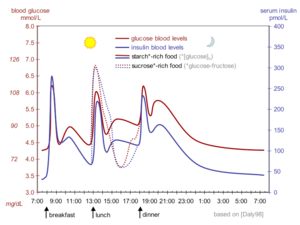Blood sugar level facts for kids
Your blood sugar level (also called blood glucose) is how much glucose (a type of sugar) is in your blood. It's super important for your body to keep this level just right. This balancing act is called homeostasis.

Contents
What is Blood Sugar?
The amount of glucose in your blood changes throughout the day. It goes up after you eat food because your body breaks down food into glucose. It's usually lowest before breakfast and goes up for an hour or two after meals.
Your blood always has about 4 grams of sugar dissolved in it (that's like a teaspoon!). Your body also stores glucose in your skeletal muscles and liver as something called glycogen. When you haven't eaten for a while, your body uses this stored glycogen to keep your blood sugar steady.
Glucose travels from your gut or liver to other parts of your body through your blood. A hormone called insulin, made in your pancreas, helps your body's cells take in this glucose.
Keeping blood sugar levels just right is key for many parts of your body to work well, especially your human brain. Your brain uses about 60% of the glucose in your blood when you're resting! If your blood sugar stays too high for too long, it can harm your cells. This can lead to serious health problems, especially for people with diabetes.
How is Blood Sugar Measured?
Doctors can measure your blood sugar level with a simple blood test. Often, this test is done after you haven't eaten for at least eight hours (like overnight). This is called a "fasting" blood sugar test. It's the first test doctors use to check for problems with how your body handles sugar, like diabetes or hypoglycemia (low blood sugar).
After you eat, it's normal for your blood sugar levels to go up for the first two hours.
Blood sugar levels are usually measured in two ways:
- Milligrams of glucose per deciliter (mg/dL)
- Millimoles of glucose per liter (mmol/L)
Normal Blood Sugar Levels
When you are fasting (have not eaten for a while), a normal blood sugar level is usually between 70 and 100 mg/dL (which is 3.9 to 5.6 mmol/L). This is called normoglycemia.
Low Blood Sugar (Hypoglycemia)
If your blood sugar level drops below 70 mg/dL, it's called hypoglycemia. When this happens, you might feel:
- Tired or sleepy
- Confused or unable to think clearly
- Irritable or grumpy
- Shaky or weak in your arms and legs
- Pale skin
- Sweaty
- In severe cases, you might even pass out.
High Blood Sugar (Hyperglycemia)
If your fasting blood sugar is between 100 and 125 mg/dL, it's called impaired fasting glucose. This means your body isn't handling sugar as well as it should.
If your fasting blood sugar is 126 mg/dL or higher, it's called hyperglycemia. This is the most common sign of diabetes. Diabetes happens when your body either doesn't make enough insulin (Type 1 diabetes) or doesn't use insulin properly (Type 2 diabetes).
If blood sugar levels stay too high for a long time, it can cause many health problems. These include issues with your heart, eyes, kidneys, and nerves.
Many hormones help control your blood sugar. These include insulin and glucagon (both from your pancreas), adrenaline (from your adrenal glands), and other hormones like glucocorticoids.
Factors Affecting Blood Sugar
Besides the food you eat, other things can affect your blood sugar levels:
- Infections: Being sick can change your blood sugar.
- Stress: Both physical and emotional stress can make your blood sugar go up.
- Exercise: Being active, especially for a long time or if it's been a while since you ate, can also affect your blood sugar.
Even with these changes, a healthy person's body is usually very good at keeping blood sugar levels close to normal.
See also
 In Spanish: Glucemia para niños
In Spanish: Glucemia para niños
- Blood glucose monitoring
- Glycemic index
 | Kyle Baker |
 | Joseph Yoakum |
 | Laura Wheeler Waring |
 | Henry Ossawa Tanner |

